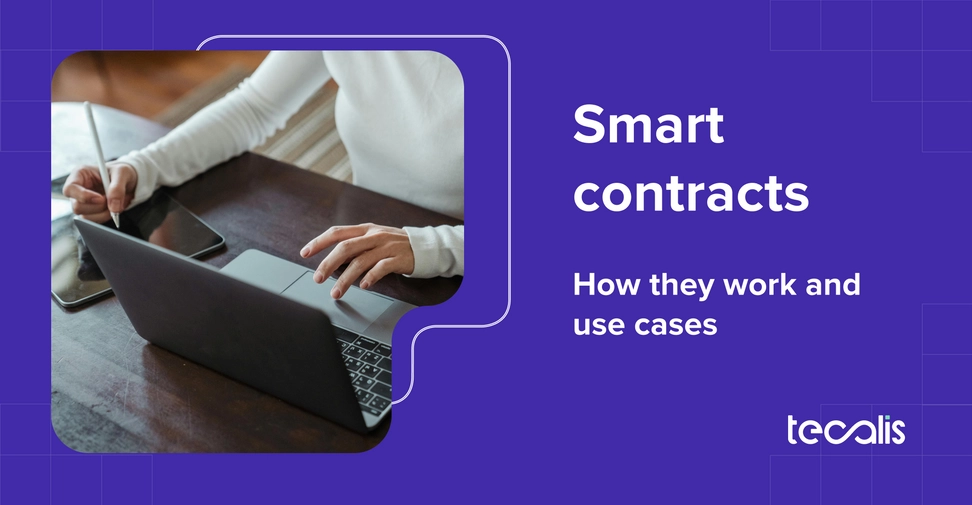Index
Get the latest news right in your inbox
Smart contracts are an innovative technology based on blockchain and digital signature that has revolutionized the way digital transactions are carried out, streamlining both simple and complex operations. In the digital age, where automation and efficiency are key, smart contracts are a revolutionary tool for managing fast automated deals and transactions.
These computer programs and their associated tools make it possible to automate the execution of contracts in a secure, transparent and efficient manner. In this article, we will explore in detail what smart contracts are, how they work, their uses and applications in different sectors, as well as the benefits they offer to users and businesses.
What are smart contracts?
Smart contracts are autonomous computer programs designed to automatically execute and enforce digital agreements without the need for intermediaries. These smart contracts are written in code and run on a blockchain network, which guarantees transparency, security, immutability and reliability of transactions. On the other hand, a smart contract is a set of sentences involving commands to be performed (in compliance with a previously agreed upon agreement).
Smart contracts are self-executing. This means that they are automatically triggered when an action takes place. They are designed to automate and enforce digital agreements, usually signed through an appropriate electronic signature standard, in a secure and reliable manner.
It is executed in a decentralized and distributed network of nodes (blockchain) that guarantees transparency and immutability of transactions. It is a set of codes that defines the rules and conditions of an agreement between two or more parties, and is automatically triggered (triggers) when a series of predefined conditions are met.
We can also speak of a smart contract when an action triggers a consequence. This is in general for any type of software that works under blockchain rules. It is an automation (sometimes performed with RPA automation technology) that acts as a trigger to execute operations in companies for example (in business systems and tools and commercial channels such as ERPs, CRMs, BSSs, etc).
Blockchain: the smarter way to execute a contract or agreement
Blockchain technology is the fundamental basis for smart contracts. A blockchain is a decentralized and distributed digital registry that securely records all transactions in a network. The smart contract is executed in this environment, which ensures that the agreed terms are fulfilled automatically and without the intervention of third parties.
In this way, the blockchain network acts as an immutable digital ledger that records all transactions made between two parties. Smart contracts, on the other hand, are made within this blockchain and use its infrastructure to automatically verify and enforce the terms of a previously defined contract that has been signed by the parties by digital signature.
The most important feature of the blockchain in this context is its decentralized nature, which means that there is no central authority controlling or supervising transactions. Instead, trust and responsibility are distributed among all participants in the network, ensuring the integrity and security of smart contracts, as well as non-repudiation.
We should also mention the concept of smart property, which is controlled and used through the use of smart contracts. It has to do with the tokenization of physical and digital assets, such as real estate, artwork or vehicles, converting them into digital tokens with contract that can be exchanged and transferred efficiently on the blockchain (in smart contracts).
This democratizes access to investment in high-value assets and facilitates the division of ownership among multiple owners. It is like attaching a unique tag or unalterable chip that seals the smart contract to associate a property to an owner. All the features of blockchain, such as decentralization, transparency and interoperability, allow smart contracts to be trusted and transparent.

How does a smart contract work?
Smart contracts work through a set of predefined rules and conditions that are coded in a specific programming language, such as Solidity in Ethereum. Once the conditions previously agreed between the parties are given, the contract is automatically executed and transactions are carried out instantly and securely.
The operation of a smart contract is based on these agreed conditions set out in the contract code. In other words, in order to be executed, the parties have had to previously agree on this method of operation and execution of the transactions associated with what has been agreed in the contract. These rules determine what actions are to be taken, the manner in which they are to take place and when they are to be executed depending on certain events or conditions.
This eliminates the need for intermediaries and operators in the processes of processing and executing contracts and agreements, ensuring that transactions are carried out efficiently and without risk of fraud, bias or human error. The operation of a smart contract is based on three pillars:
- Code: The contract is written in a blockchain-specific programming language, such as Solidity.
- Conditions: The conditions to be fulfilled for the execution of the contract previously accepted by the parties involved are defined.
- Execution: When the conditions are met, the contract and its associated actions (consequence of the events occurred) are automatically executed without the need of intermediaries.
- Traceability: Everything that happens is recorded in the blockchain network, and technologies such as time stamping are used to leave evidence.
For this to happen, different IT systems and applications must be configured and integrated to ensure that events are recorded and appropriate actions are taken upon execution of the smart contract. The process automation tools in companies make it possible to build automated models that save time and costs for both their teams and users.
What are smart contracts for? use cases and applications
Before going into detail about the different types of smart contracts and their examples, it is important to highlight their versatility and their ability to adapt to a wide variety of applications, industries and business use cases. This is due to the sheer number of applications of blockchain technology. It is especially relevant in fast processes and when you have a large volume of transactions that need to be executed in an agile manner.
Smart contracts can play a crucial role in copyright and intellectual property management, automating the process of licensing and distributing digital content to ensure fair and transparent compensation for content creators. In healthcare, smart contracts have many uses, being used to manage access and privacy of electronic medical records or digital prescriptions, ensuring the confidentiality and integrity of patient information.
These additional examples further highlight the breadth of applications and transformative potential of smart contracts in various industries and business processes. Below is a summary of what smart contracts are for and their uses and applications by relevant sectors:
- Finance and banking: A smart contract is used in a variety of financial and banking applications, such as international payments, peer-to-peer lending, token issuance and digital asset management (buying and selling stocks, currencies, dividend endowments, etc.). Similarly, we can find them when we perform operations through our banks' apps (generally preceded by a digital signature request): money transfers, loans, asset management, insurance, etc.
- Insurance: In this industry, one of the most common and innovative uses is the automatic execution of insurance contract conditions (e.g. on/off or usage-based insurance). Smart contracts can automate the process of policy issuance, claims management and payment settlement. This ensures a fast and efficient response in the event of a claim, reducing processing times and improving customer satisfaction.
- Telecommunications: In the telco sector, smart contracts can be used to manage service contracts between providers and customers. This includes the automatic activation and deactivation of services such as mobile lines, data plans and internet services, according to the conditions and terms specified in the electronically signed contract. Smart contracts can also facilitate automated billing and payment management, ensuring a seamless experience for users and optimizing operational efficiency for telcos. Furthermore, in the field of telecommunications networks, a smart contract can be used to automate the configuration and management of network devices, facilitating the implementation of security policies and optimizing network performance. This helps to reduce operating costs and improve quality of service for end users, integrated into BSS systems such as Tecalis Customer Hub.
- Utilities and energy: In much the same way as in telecommunications, in the energy and utilities sector, smart contracts can facilitate the trading of renewable energy and carbon or solar credits, allowing users to buy, sell and trade energy from renewable sources in a transparent and efficient manner, among many other uses.
- Logistics and supply chain: In supply chain and logistics, smart contracts are used to optimize inventory management, track product movement and automate delivery and payment processes. Similarly, we find the use of smart contracts in product tracking, quality controls and all kinds of back-office operations of a retail network's points of sale.
- Identity and access management: Smart contracts are used to manage digital identity and access to online services in a secure and decentralized way in systems running SCA (Strong Customer Authentication) and for open banking/financce PSD2/3 bank scraping connections. This includes user identity verification, transaction authentication and data and resource access permission management.
- GovTech: In government, smart contracts are used to improve efficiency and transparency in a variety of areas, including identity management for internet access to public services, e-voting and government contract administration.
- Event and ticket management: Smart contracts are used for event management, ticket sales and ticket issuance, guaranteeing the authenticity of digital tickets and facilitating the transfer of ownership in a secure and transparent manner. This includes ticket validation at the event venue and refund management in case of cancellation or date change.
Smart contracts: Types and examples
Depending on their complexity and functionality, we can categorize smart contracts into different types:
- Simple contracts: Automate simple tasks, such as transferring money when a condition is met, with digital signature.
- Complex contracts: Allow the management of more elaborate agreements, such as the purchase and sale of a property, with electronic signature.
- Contracts with oracles: They integrate with external data sources to verify information and execute actions (based on predefined triggers and triggers). They use RPA technologies.
An example of a smart contract is for the purchase and sale of a property, being able to automate the payment process, transfer of ownership and registration. Other examples include:
- Payment contracts: These contracts automate the process of transferring funds once certain conditions are met, such as the delivery of goods or services.
- Service provision and activation contracts: These smart contracts trigger confirmation to register a phone line, for example, associated with a particular user and validate their credentials.
- Insurance contracts: Manage claims and payments automatically in case of predefined events, such as accidents or natural disasters.
- Betting contracts: Facilitate all operations with smart contracts for online betting and gambling in a secure and transparent manner once the game has been completed.
- Loan contracts: Automate the process of lending and repayment of funds between lenders and borrowers, eliminating the need for traditional financial intermediaries.

Electronic signature in a smart contracting
Electronic signatures are a crucial component in smart contracts, as they validate the identity of the parties involved and guarantee the authenticity of the agreement. Electronic signatures are generated using cryptographic keys and recorded in the blockchain, providing an additional level of security and confidence in the process, which is recorded in the audit trail.
Similarly, the parties involved in a contract digitally sign the agreement using an appropriate electronic signature tool prior to the execution of the smart contract, ensuring the authenticity and integrity of the subsequent transaction when defined clauses are given, which will then allow the consequences to be executed through the smart contract.
This provides irrefutable proof of acceptance of the terms by all parties involved, as digital signatures cannot be forged or modified without the consent of the relevant parties.
There is a difference between smart contracts and legal smart contracts and it lies in this use of electronic signatures. A smart contract will be considered legal and enforceable as a contract when it has been made under the standards defined by the jurisdiction in which it takes place. Therefore, using eIDAS electronic and digital signatures for smart contracts makes them legal smart contracts.


RPA in smart contracts
Robotic process automation (RPA) is used to build the operating models of smart contracts. RPA bots can perform repetitive tasks, such as verifying data or updating records, which streamlines the contract execution process and minimizes human error.
RPA bots can also be integrated with external systems, such as databases and business management systems, to further automate workflow and improve interoperability between different platforms and applications.
Benefits and advantages of smart contracts
Smart contracts offer a number of benefits and advantages for both individual users and businesses, including:
- Efficiency: Smart contracts automate the process (and all associated actions and operations) of contract execution, reducing the need for human intervention, increasing security and streamlining transactions.
- Transparency: All transactions carried out on a blockchain are transparent and publicly verifiable, ensuring integrity and trust in the process.
- Security: Advanced cryptography and blockchain decentralization protect data and transactions from manipulation and fraud.
- Trust: The inherent reliability of blockchain technology and the impossibility of modifying records ensure trust between the parties involved.
- Cost reduction: By eliminating intermediaries and reducing the risk of errors and fraud, smart contracts can help reduce the costs associated with traditional transactions and contracts. In addition, integrating these technologies means that solutions such as Customer Hub are already being used, which reduce costs by creating simple digital platforms where all business operations can be carried out.
- Global access: The decentralized nature of the blockchain means that smart contracts can be accessed from anywhere in the world, facilitating international transactions and collaboration between different stakeholders.
In short, smart contracts are an innovative technological solution that has transformed the way digital transactions are conducted in a wide variety of industries. Their ability to automate, enforce agreements and execute transactions securely and efficiently makes them an indispensable tool in today's economy.

























